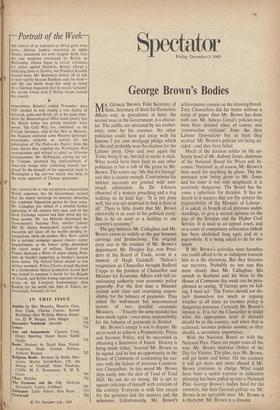George Brown's Bodies
MR. GEORGE BROWN, First Secretary of State, Secretary of State for Economic Affairs and, in precedence at least, the second man in the Government, is a charac- ter. The public are attracted by his exuber- ance, even by his excesses. No other politician could have got away with his famous 3 per cent mortgage pledge which in the end probably won the election for the Labour party. Over and over again the Tories bring it up, but fail to make it stick. What would have been fatal to any other politician is but a rub of the green to Mr. Brown. The voters say `Ah, but it's George' and that is answer enough. Contrariwise his mildest successes are greeted with awe- struck admiration. As Dr. Johnson observed of a woman preaching and a dog walking on its hind legs: 'It is not done well, but you are surprised to find it done at all.' There is little doubt that Mr. Brown electorally is an asset to his political party. But is he an asset or a liability, to our country's economy?
The gap between Mr. Callaghan and Mr. Brown yawns as widely as the gap between earnings and 'productivity. The original error was in the creation of Mr. Brown's department. Mr. Douglas Jay, now Presi- dent of the Board of Trade, wrote in a memoir of Hugh Gaitskell : 'Dalton's resignation as Chancellor brought Stafford Cripps to the position of Chancellor and Minister for Economic Affairs with full co- ordinating authority over economic policy generally. For the first time a Minister existed with clear and overriding respon- sibility for the balance of payments. Thus ended the well-meant but misconceived system of two parallel economic Ministers.. ..' Exactly the same mistake has been made again : once more responsibility for the balance of payments is divided.
Mr. Brown's energy is not in dispute. He set to work to achieve a Productivity, Prices and Incomes Policy, and he succeeded in obtaining a Statement of Intent. 'History is being made today,' boasted Mr. Brown as he signed, and he lost no opportunity in the House of Commons of contrasting his suc- cess with the failure of previous Conserva- tive Chancellors. In this mood Mr. Brown slips easily into the skin of Toad of Toad Hall. He can do no wrong. He is apt to equate criticism of himself with criticism of the country. Everyone is with him except for the groaners and the sneerers and the saboteurs. Unfortunately, Mr. Brown's achievements remain on the drawing-board. Tory Chancellors did far better without a scrap of paper than Mr. Brown has done with one. Mr. Selwyn Lloyd's policies may have been derided (that, of course, was `constructive criticism' from the then Labour Opposition) but at least they worked. Mr. Brown's policies are being de- rided—and they have failed.
Much of the derision settles on the un- happy head of Mr. Aubrey Jones, chairman of the National Board for Prices and In- comes. 'National' is, of course, Mr. Brown's boss word for anything he plans. The im- portance now being given to Mr. - Jones and his team is not only misplaced; it is positively dangerous. The Board has be- come a substitute for decision. It has re- ferred to it matters that are (by statute) the responsibility of the Minister of Labour: it is asked, in breach of all previous under- standings, to give a second opinion on the pay of the Services and the Higher Civil Service. It is used as an appeal court, and as a court of compulsory arbitration (which has been abolished long ago), and as a pigeonhole. It is being asked to do far too much.
If Mr. Brown's activities were harmless one could afford to be as indulgent towards him as is the electorate. But they threaten our recovery. Probably no one sees this more clearly than Mr. Callaghan. His speech in Scotland and his hints in the House of Commons this week can be para- phrased as saying, 'If George goes on fail- ing, I must act.' The Tories should not dis- turb themselves too much in arguing whether at all times an incomes policy is dangerous nonsense. Certainly Mr. Brown's version is. It is for the Chancellor to judge what the appropriate level of demand should be in the country, and when that is achieved, incomes policies assume, as they should, a secondary importance.
With the National Board so with the National Plan. There are paper roses all the way. Mr. Brown mistakes Orders of the Day for Victory. The plan, says Mr. Brown, will get better and better. On the contrary it will get more and more absurd if Mr.
Brown continues in charge. What could have been a useful exercise in indicative planning has been puffed up into a National Plan. George Brown's bodies head for the cemetery, but their General gallops on. Mr. Brown is an agreeable man. Mr. Brown is a character. Mr. Brown is a disaster.






































 Previous page
Previous page